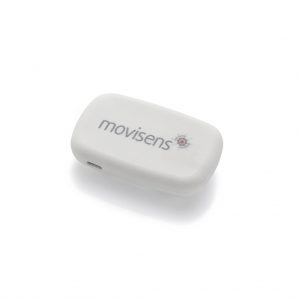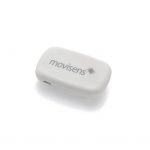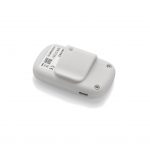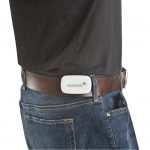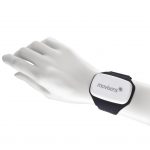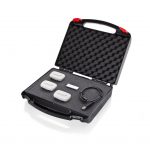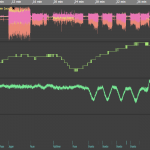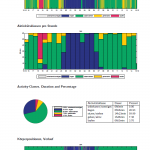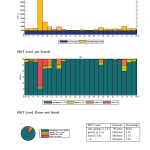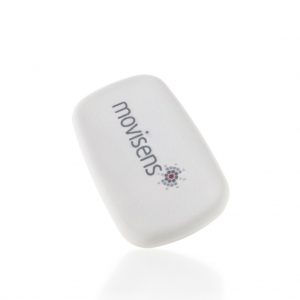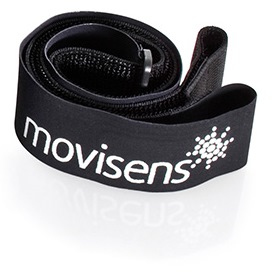Move 3 – Capteur d'Activité
Le Move 3 est le capteur portable le plus précis pour l'acquisition de l'activité physique. Le capteur est équipé d'une interface Bluetooth Smart et offre la possibilité d'analyser en ligne les données du capteur. Il est optimisé pour des fins de recherche et d'évaluation ambulatoire interactive.
Le capteur enregistre les données brutes d'accélération tridimensionnelle, de pression barométrique de l'air et de température jusqu'à 2 mois.
A partir de ces données, des paramètres comme le taux d'activité, la position du corps, les pas, la dépense énergétique et les équivalents métaboliques (Excel) peuvent être secondairement calculés à l'aide du logiciel DataAnalyzer de movisens, ainsi que des rapports significatifs (PDF).
Le capteur peut être fixé à l'aide soit d'un clip au niveau de la hanche (Move 3 Clip, article n° 10111), soit d'un bracelet (Move 3 Wrist, article n° 10112).
Découvrir les nouveaux modèles
Postulez gratuitement pour le projet d'étudiant
Principales caractéristiques
- Analyse des données de capteurs en ligne
- Interface Bluetooth Smart
- Une reconnaissance précise et validée des activités quotidiennes
- Un calcul exact et validé de la dépense énergétique
- De meilleurs résultats grâce au capteur barométrique de l'altitude
- Des données durables grâce au format de fichier ouvert
- Un fonctionnement optimisé pour les études
- Java API pour USB (Windows)
- API: Exemple pour Bluetooth Smart (Android)
Applications
- Evaluation ambulatoire interactive
- Monitorage comportemental
- Calcul de la dépense énergétique
- Reconnaissance de l'activité
- Détection du pas
- Acquisition des positions du corps
- Acquisition de l'inactivité, de la position assise et de la position debout
- L'activité physique en tant que paramètre contextuel
Produits et services adaptés

SensorTrigger
movisensXS-Feature pour Évaluation interactive
Echantillonnage de l'expérience basée sur Smartphone
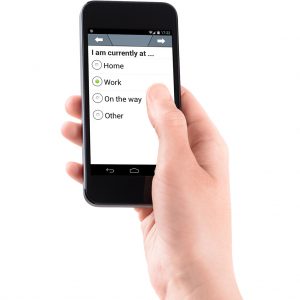
movisensXS
Echantillonnage de l'expérience plateforme
Solution d'échantillonnage de l'expérience basée sur un smartphone
Téléchargement
| Newsletter |
|
|---|---|
| Software |
|
| Documentation |
|
| Exemple de données |
|
| Exemple de rapports | |
| Outils externes |
Fiche technique
|
Power supply |
Lithium-Polymer-Battery |
|
Supply voltage |
3 V |
|
Battery voltage |
3,0 - 4,2 V |
|
Number of charging cycles |
300 with 1C/1C > 80% |
|
Maximum recording capacity |
~2 month |
|
Battery run time (recording) |
~7 days |
|
Size of sensor (W x H x D) |
62,3 x 38,6 x 11,5 mm |
|
Weight of sensor |
25 g |
|
Internal sensors |
3D acceleration sensor: Measurement range: +/- 8 g Noise: 4 mg Output rate: 64 Hz
Pressure sensor: Measurement range: 300 - 1100 hPa Noise: 0.03 hPa Output rate: 1 Hz |
|
Indicators |
LED, 3-color (operation and charging status) Vibration alarm (start and end of measurement) |
|
Interfaces |
Micro-USB, Bluetooth Smart |
|
Environmental conditions |
Temperature: -20 °C to 60 °C 0 °C to 45 °C during charging Humidity: 0 to 75% RH relative humidity Atmospheric pressure: 300 to 1100 hPa absolute |
Littérature et validations
- Actigraph-Measured Movement Correlates of Attention-Deficit/Hyperactivity Disorder (ADHD) Symptoms in Young People with Tuberous Sclerosis Complex (TSC) with and without Intellectual Disability and Autism Spectrum Disorder (ASD)..
- Accuracy of Sedentary Behavior–Triggered Ecological Momentary Assessment for Collecting Contextual Information: Development and Feasibility Study.
- Mood and dysfunctional cognitions constitute within-subject antecedents and consequences of exercise in eating disorders..
- OREBA: A Dataset for Objectively Recognizing Eating Behaviour and Associated Intake..
- Improving mobility and participation of older people with vertigo, dizziness and balance disorders in primary care using a care pathway: feasibility study and process evaluation.
- Fear of Physical Activity, Anxiety, and Depression. Barriers to Physical Activity in Outpatients With Heart Failure?.
- The Freiburg sport therapy program for eating disorders: a randomized controlled trial..
- Using Acceleration Data for Detecting Temporary Cognitive Overload in Health Care Exemplified Shown in a Pill Sorting Task.
- Sedentary behavior in everyday life relates negatively to mood: An Ambulatory Assessment study.
- Promotion of physical activity-related health competence in physical education: study protocol for the GEKOS cluster randomized controlled trial.
- Dynamics of Intraindividual Variability in Everyday Life Affect Across
Adulthood and Old Age. - Real-Time Detection of Spatial Disorientation in Persons with Mild Cognitive Impairment and Dementia.
- Neural correlates of individual differences in affective benefit of real-life urban green space exposure.
- Energy Expenditure During Incline Walking – Benefits of Integrating a Barometer into Activity Monitors.
- Individual Differences in the Competence for Physical-Activity-Related Affect Regulation Moderate the Activity–Affect Association in Real-Life Situations.
- Embodied learning in the classroom: Effects on primary school children's attention and foreign language vocabulary learning.
- Intermittent Fasting (Alternate Day Fasting) in Healthy, Non-obese Adults: Protocol for a Cohort Trial with an Embedded Randomized Controlled Pilot Trial.
- A novel algorithm for detecting human circadian rhythms using a thoracic temperature sensor Article history :.
- Physical Activity and Depressive Mood in the Daily Life of Older Adults.
- Measuring Fear of Physical Activity in Patients with Heart Failure.
- Lightweight Visual Data Analysis on Mobile Devices - Providing Self-Monitoring Feedback.
- Contributions à l’élaboration d’un système d’aide médico-sociale à l’aide d’un robot humanoïde.
- Situationsadaptive Navigationsassistenz für Menschen mit Demenz.
- Real-Time Management of Multimodal Streaming Data for Monitoring of Epileptic Patients.
- Bewegungsangst bei chronischer Herzinsuffizienz – Erste Ergebnisse zur Validierung eines Messinstruments..
- Fitness, kognitive Leistungsfähigkeit und Wohlbefinden bei jungen Erwachsenen - Interventionsstudien zum Einfluss von Ausdauertraining.
- Validation and comparison of two methods to assess human energy expenditure during free-living activities.
- Erfassung körperlicher Aktivität mittels Akzelerometrie - Möglichkeiten und Grenzen aus technischer Sicht.
- Home-based system for physical activity monitoring in patients with multiple sclerosis (Pilot study)..
- Detection of Parameters to Quantify Neurobehavioral Alteration in Multiple Sclerosis Based on Daily Life Physical Activity and Gait Using Ambulatory Assessment.
- Using Support Vector Regression for Assessing Human Energy Expenditure Using a Triaxial Accelerometer and a Barometer.
- A Comparison of Two Commercial Activity Monitors for Measuring Step Counts During Different Everyday Life Walking Activities.
- The Association between Short Periods of Everyday Life Activities and Affective States: A Replication Study Using Ambulatory Assessment.
- Characteristics of the activity-affect association in inactive people: an ambulatory assessment study in daily life.
- Acute and medium term effects of a 10-week running intervention on mood state in apprentices.
- Measurement of daily mobility under fampridine-therapy with Movisens-system in patients with multiple sclerosis.
- Assessment of Human Gait Speed and Energy Expenditure Using a Single Triaxial Accelerometer.
- Aktuelle Messverfahren zur objektiven Erfassung körperlicher Aktivitäten unter besonderer Berücksichtigung der Schrittzahlmessung.
- Kindergarten in Bewegung. Zur Qualität von Bewegungskindergärten..
- Assessment der Mobilität im Alltag zur Unterstützung von MS-Patienten.
- A new method to estimate energy expenditure using accelerometry and barometry-based energy models.
- Validity of the kmsMove-sensor in calculating energy expenditure during different walking intensities.
- Estimation of energy expenditure using accelerometers and activity-based energy models - validation of a new device.
- Trends und Möglichkeiten zur Erfassung körperlicher Aktivität im Alltag.
- Einsatz sensorgestützter Verfahren im Gesundheitswesen: Herausforderungen und Lösungsansätze.
- Bewegungskindergärten: empirische Befunde und praktisches Wissen.
- Energieumsatzmessung mit Aktivitätssensoren – Validität des kmsMove-Akzelerometers.
Vous trouverez plus de publications ici.
